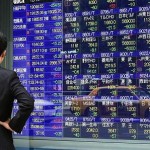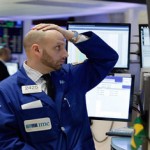Dow Tumbles Nearly 400 Points on China Worries

Dow industrials, S&P 500 are off to their worst-ever starts to the year
The Dow Jones Industrial Average fell nearly 400 points Thursday as steep falls in Chinese equities spilled over to global markets.
Thursday’s selloff came after the People’s Bank of China made its largest downward adjustment to the yuan since August. The country’s stock market fell more than 7% amid concerns about capital flight from the Asian giant, and China’s stock markets stopped trading after only 30 minutes, ending the shortest trading day in their history after the newly installed mechanism to limit volatility was triggered for the second time this week.
The Dow industrials dropped 392.41 points, or 2.3%, to 16514.10. The S&P 500 dropped 2.4%. Both indexes are off to their worst starts ever, with the Dow down 5.2% over the first four trading days of the year and the S&P 500 off 4.9%.
The Nasdaq Composite, which declined 3% on Thursday, is having its worst start since 2000, down 6.4%.
Traders said while they prepared for a frenzied trading session there was relatively little urgency in the selling.
“U.S. markets are getting wrapped in with global markets, and rightfully so, but so far there isn’t massive panic selling here,” said Jonathan Corpina, senior managing partner at Meridian Equity Partners.
Stock market declines worsened in afternoon trading as investors braced for another potential drop in Chinese stock markets on Friday. Traders said many investors made late-day bets against the S&P 500 in case there is additional turmoil in China on Friday that again spills over to U.S. markets.
Markets around the globe fell on Thursday. Japan’s Nikkei Stock Average, Australia’s S&P/ASX 200 and Hong Kong’s Hang Seng Index each lost more than 2%.
The Stoxx Europe 600 fell 2.2% after earlier declining as much as 3.6%.
China said later Thursday that it would suspend its new circuit breaker mechanism that has been at the center of its stock market unrest.
The fears about China spread to commodity markets, sending U.S.-traded oil down 2.1% to $33.27 a barrel amid concerns about future demand from the world’s second-largest consumer of crude. Base metals from copper to nickel also fell.
The rush to safe-haven investments, such as gold and U.S. government bonds, also picked up in afternoon trading. Gold ticked up 1.4% to $1107.70 an ounce. The yield on the U.S.10-year Treasury fell to 2.153% from 2.177% on Wednesday. Yields fall as prices rise.
In currencies, the onshore Chinese yuan broke to its lowest level since 2011 against the dollar. The euro gained against the dollar, while the dollar was down against the safe-haven yen.
China has dominated the stock market in 2016 thus far. Markets opened on Monday to a weaker yuan and lackluster manufacturing data, and sharp declines in Chinese stocks have prompted authorities to halt trading on two separate occasions this week, sending ripples throughout global markets.
“The interpretation is that the currency market manipulation tells you the economy is doing worse than expected,” said Johan Javeus, chief strategist at SEB Group. “Maybe growth is slowing faster, and that’s something we’re concerned about outside China.”
Analysts are also concerned that a devaluation of the yuan will push neighboring countries to lower their currencies, dampening Chinese demand for imports and further hurting confidence in the country’s economy.
Investors spent Thursday debating whether the falls in Chinese markets—which haven’t always acted as an accurate proxy for the underling economy—will continue and lead to further losses in global markets.
Some investors shrugged off the Chinese declines, saying they were likely magnified by the threat of an expiring ban on selling by large shareholders.
Nicholas Melhuish, head of global equities atAmundi Asset Management, said he expects a tough first half of the year with a lot of volatility. Many of the issues that plagued global equity markets last year, including shifts in the Chinese economy, trouble in emerging markets and a slowly tightening Federal Reserve, have already surfaced in the first sessions of the year.
“It could be quite a volatile year with a lot of issues lingering from last year brought to the fore in the first week,” Mr. Melhuish said.
Source: WSJ – Dow Tumbles Nearly 400 Points on China Worries




























